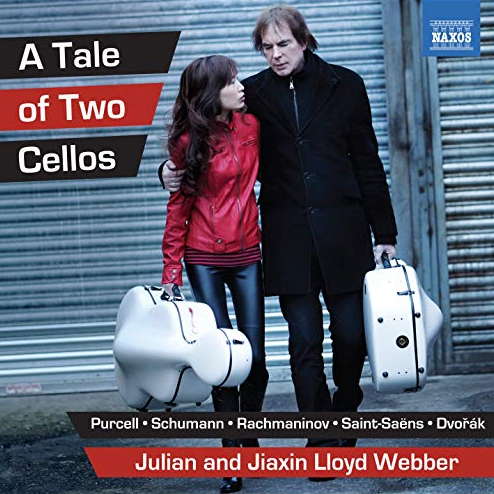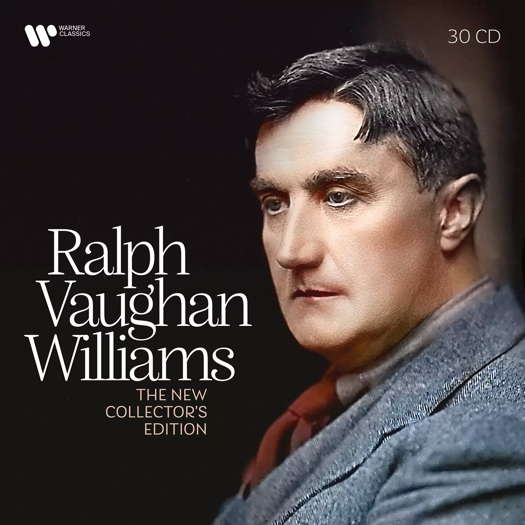 SPONSORED: CD Spotlight. Uncommon Piquancy - Music for two cellos, heard by Howard Smith.
SPONSORED: CD Spotlight. Uncommon Piquancy - Music for two cellos, heard by Howard Smith.
All sponsored features >>
 FEEDBACK: She said WHAT? Read what people think about our Classical Music Daily features, and have your say!
FEEDBACK: She said WHAT? Read what people think about our Classical Music Daily features, and have your say!
 DISCUSSION: What is a work? John Dante Prevedini leads a discussion about The performing artist as co-creator, including contributions from Halida Dinova, Yekaterina Lebedeva, Béla Hartmann, David Arditti and Stephen Francis Vasta.
DISCUSSION: What is a work? John Dante Prevedini leads a discussion about The performing artist as co-creator, including contributions from Halida Dinova, Yekaterina Lebedeva, Béla Hartmann, David Arditti and Stephen Francis Vasta.

Alive and Impassioned
GERALD FENECH is impressed by Warner Classics' thirty CD Vaughan Williams New Collector's Edition
'... the music is often presented in all its thrilling drama to telling effect.'
In some ways, Ralph Vaughan Williams' background and upbringing were solidly Victorian upper-middle class. He was born on 12 October 1872 during a time of great controversy brought about by Charles Darwin's The Origin of Species. Indeed, Ralph's mother was a close relative of Darwin but it seems the boy was not affected by the turmoil around him. He was educated at Charterhouse and Trinity College, Cambridge, but his love of music had already manifested itself when Ralph was just six years old through a piano piece entitled The Robin's Nest, which still survives from that time. After Charterhouse, he went directly to the Royal College of Music to study with Hubert Parry of Jerusalem fame.
After graduating from Cambridge in 1895 he returned to the RCM, where one of his fellow students was Gustav Holst. The two had a wonderful relationship until Holst's death in 1934. Together they walked the countryside, collecting examples of authentic English folksong which was then already under threat.
Then in 1903 came a turning point. Vaughan Williams heard an old Essex shepherd singing the traditional song Bushes and Briars, and this experience drove him to start striving for a new kind of national music devoid of Elgarian pomp and circumstance.
Listen — arranged by Vaughan Williams: Bushes and Briars
(0190296245374 CD22 track 12, 0:43-1:22) ℗ 1970/1995 Parlophone Records Ltd :
His works grew more ambitious; then after a formative period as a pupil of Maurice Ravel in Paris, he returned refreshed with a new sense of identity and purpose. It was a period rich with some of the composer's most loved works: A Sea Symphony (1909), On Wenlock Edge (also 1909), the Tallis Fantasia (1910), Five Mystical Songs (1911) and A London Symphony (1913).
Listen — Vaughan Williams: Lento (A London Symphony)
(0190296245374 CD2 track 2, 5:53-6:51) ℗ 1993 Parlophone Records Ltd :
Then came the tragedy of the First World War, which turned Vaughan Williams' life upside down. Enlisting as a private in the Royal Army Medical Corps, his experience at the front marked him deeply. He lost several friends, among them the young composer George Butterworth, and the spectre of war remained with him till the very end of his life. Indeed, in the 1922 A Pastoral Symphony there is one obvious memory of the front: an evocation of a not-quite perfect bugler practising what could be the 'Last Post'. It is a poignant, disquieting moment.
Listen — Vaughan Williams: Lento moderato (A Pastoral Symphony)
(0190296245374 CD3 track 2, 4:43-5:28) ℗ 1992 Parlophone Records Ltd :
Back in England, Vaughan Williams' career returned to something like normal. He joined the staff of the RCM, became conductor of the Bach Choir and organised his own music festival at Leith Hill. But his works, especially those written from the 1930s onwards, show increasingly dark, even violent, tendencies: the eruptive, brutal force of the Fourth Symphony (1935) startled audiences.
Listen — Vaughan Williams: Allegro (Symphony No 4)
(0190296245374 CD3 track 5, 0:01-0:41) ℗ 1992 Parlophone Records Ltd :
During the Second World War, the engagement with folk music continued to deepen, culminating in the serene mastery of the Fifth Symphony (1943).
Listen — Vaughan Williams: Romanza (Symphony No 5)
(0190296245374 CD4 track 6, 0:00-0:50) ℗ 1987 Parlophone Records Ltd :
Four years later, however, he explored further the dark vein: the eerie, almost expressionless, epilogue of the Sixth Symphony remains one of the most disturbing things in English music.
Listen — Vaughan Williams: Epilogue (Symphony No 6)
(0190296245374 CD5 track 4, 0:05-1:00) ℗ 1994 Parlophone Records Ltd :
Throughout his long life, Vaughan Williams remained a man of deep principle, a liberal in the nineteenth century sense. Having refused a knighthood, he eventually accepted the Order of Merit, because it was the only award offered for achievement alone. At the beginning of the Second World War he threw himself into morale-boosting musical tasks, but at the same time he stood up vigorously for communist composer Alan Bush and the pacifist Michael Tippett when their convictions got them into trouble, even though he did not share those convictions.
Central to his own philosophy was the idea that true 'national music', as he called it, could not be narrow or xenophobic. It was by exploring their musical-national roots that composers become most fully human, and thus able to address the largest possible human audience. Vaughan Williams retained his mental strength almost to the end. Very late works, such as the Ten Blake Songs (1957) and the Ninth Symphony (1958) suggest, even in his eighties, the beginning of a new artistic phase.
Listen — Vaughan Williams: A Poison Tree (Ten Blake Songs)
(0190296245374 CD20 track 11, 1:11-1:55) ℗ 1971/1987 Parlophone Records Ltd :
He died on 26 August 1958. After his death, Vaughan Williams was not only considered as a visionary of enormous range, but also as the musical poet of the English landscape.
This magnificent edition, celebrating the 150th anniversary of the composer's birth, groups together almost all of the composer's output recorded in both mono and stereo over a period of some fifty years (from the early 1950s to the beginning of the 2000s). Performed by the English artistic cream of those years, whether orchestras, conductors, soloists, instrumentalists or singers, the level of interpretations is consistently alive and impassioned, and in the symphonic pieces in particular, the music is often presented in all its thrilling drama to telling effect.
Listen — Vaughan Williams: Is My Team Ploughing? (On Wenlock Edge)
(0190296245374 CD18 track 22, 2:33-3:31) ℗ 1984 Parlophone Records Ltd :
All your favourite Vaughan Williams spanning over some thirty-four hours. Any place is a good place to start.
Copyright © 7 November 2022
Gerald Fenech,
Gzira, Malta

CD INFORMATION - VAUGHAN WILLIAMS: THE NEW COLLECTOR'S EDITION


